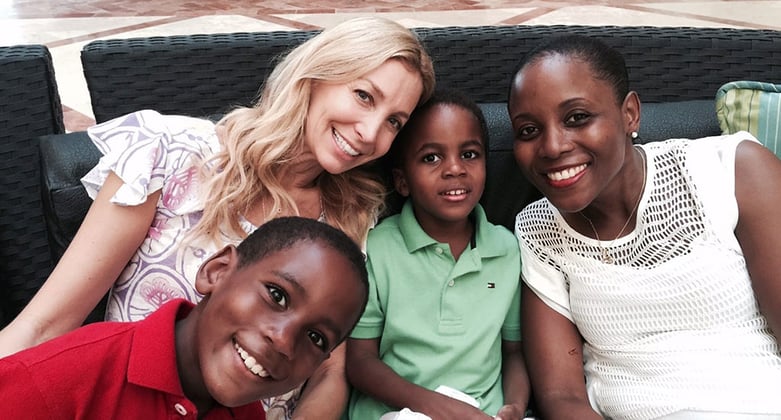Autism expert Dr. Sheryl Rosin, Ph.D., CCC-SLP, conducted a workshop at the University of Medicine and Health Sciences in early September 2015 for teachers working with autistic children. Dr. Rosin, a leading speech and language pathologist, stresses the need for early intervention, as well as helping children with their social skills and learning. In addition, she set up a free clinic for families with autistic children.
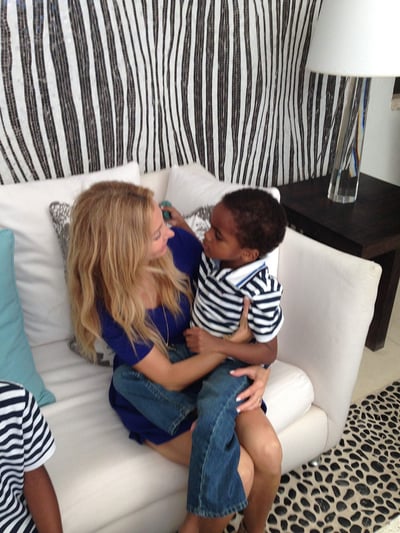 Dr. Rosin started working with individuals with autism in 1994, around the time when the definition of autism was expanded in the DSM-IV, a manual published by the American Psychiatric Association (APA). She worked as a pediatric speech-language pathologist in an outpatient rehabilitation center within a hospital setting in Royal Oak, Michigan. As Dr. Rosin tells us, she was “one of the only therapists that would work with these clients as there was little known about how to effectively treat it at that time.” She later obtained her Ph.D. from Wayne State University in speech-language pathology with a specialization in autism spectrum disorders.
Dr. Rosin started working with individuals with autism in 1994, around the time when the definition of autism was expanded in the DSM-IV, a manual published by the American Psychiatric Association (APA). She worked as a pediatric speech-language pathologist in an outpatient rehabilitation center within a hospital setting in Royal Oak, Michigan. As Dr. Rosin tells us, she was “one of the only therapists that would work with these clients as there was little known about how to effectively treat it at that time.” She later obtained her Ph.D. from Wayne State University in speech-language pathology with a specialization in autism spectrum disorders.
(Photo, inset right) DR. ROSIN: With Mathieu Marshall in St. Kitts. Photo: Michelle Peres
Throughout the years, Dr. Rosin has become one of North America’s leading autism experts. Dr. Rosin has presented at conferences for the American Speech-Language Hearing Association, Michigan Speech-Language Hearing Association, Florida Speech-Language Association and the Autism Society of America on the topic of children with ASD (Autism Spectrum Disorder). She conducts research on evidence-based practice for children with autism. She is a Professional Education Instructor and is currently a consultant for the PLAY Project, an evidence-based autism early-intervention program.
Dr. Rosin’s workshop at UMHS, with her expertise and caring nature, was appreciated by everyone involved. The UMHS Endeavour recently spoke to Dr. Rosin about a number of autism issues, from what autism is to things future doctors at American and Caribbean medical schools should know about autism to common misconceptions, including the myth that vaccines “cause” autism.
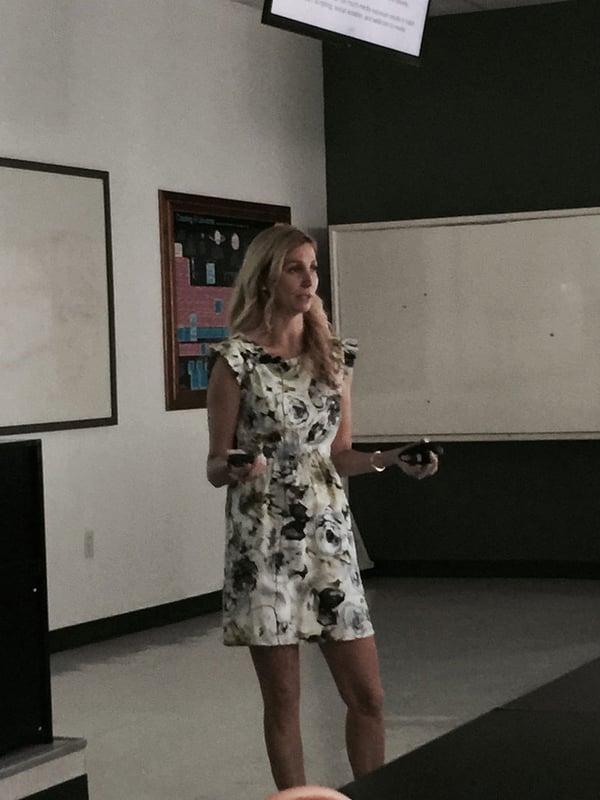
AUTISM WORKSHOP: Dr. Rosin lecturing at UMHS. Photo: Michelle Peres
UMHS ENDEAVOUR: Tell us why you decided to conduct workshops for teachers working with autistic children.
DR. SHERYL ROSIN: The idea to conduct autism training workshops for teachers in St. Kitts came about after visiting the island in January of 2014 and meeting a family with a child with autism. The family consulted with me and I recommended various treatment programs and services within the school system, but quickly learned that there were no such options on island. They explained that there were limited to no resources, advanced educators, and/or professionals trained to work with individuals with autism. From there, I invited the family to come to the US where mom and her son Mathieu joined me at Nova Southeastern University in Ft. Lauderdale, Florida to participate in a free research study. At that time, I was investigating an early intervention program for children with autism called the PLAY Project. The PLAY Project is a parent-mediated, play-based treatment program where parents/caregivers are trained to be their child’s interventionist. Mathieu and his mother participated in the intervention program for six weeks, receiving 21 hours of therapy per week. Mathieu began treatment with approximately 3-5 words in total and left with about 75 new words and was combining them to produce three word phrases. He was three years, three months at the commencement of therapy. After they returned to St. Kitts, mom was approached by many families asking her for help with their children as they had heard about what she did for Mathieu. She helped as many families as she could from what she had learned at the University, however she expressed that there was such a great need for awareness, education, and services for the people of St. Kitts.
We kept in touch and came up with The St. Kitts Autism Project that includes 4 phases: 1) teacher/professional training; 2) free intensive short-term intervention clinic; 3) development of an Early Intervention Center where children can be diagnosed early and move into early intervention services with the PLAY Project as its’ model; and 4) a certification program for teachers or professionals who want to become Certified Autism Specialists through one of the Universities there as an endorsement to their teaching certificates. Phase one took 18 months to gain approval from the St. Kitts government, but now that I have their support, I am hoping that the next three phases will move along quickly.
Can you tell us about the free clinic at UMHS and what the experience was like?
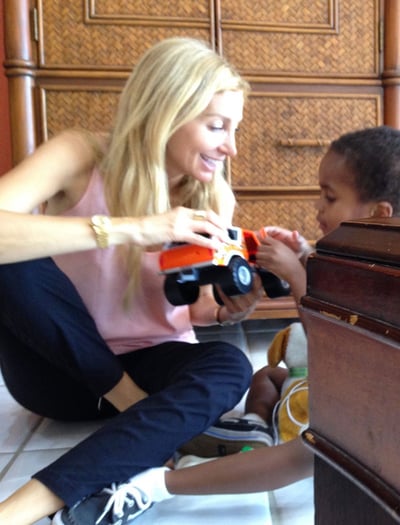 The free clinic took place at UMHS on Friday, September 4th in a small office off the Western lab and was open from 8 a.m. to 6 p.m. Families lined up as I individually met with patients ranging from 18 months to 24 years of age. I provided diagnostic assessments and interventions for eight individuals. Of the eight, three new cases of autism were diagnosed, three had previous autism diagnoses, and two had other developmental disabilities that were also diagnosed that day. The families were very grateful to have the free resource, someone to consult with about their child, and an introduction into interventions that could help their loved ones. It was an extremely beneficial and positive day for everyone as they left with answers, strategies, and hope for change. The negatives were that it was only offered for a day and that the short timeframe limited the amount of individuals I could see.
The free clinic took place at UMHS on Friday, September 4th in a small office off the Western lab and was open from 8 a.m. to 6 p.m. Families lined up as I individually met with patients ranging from 18 months to 24 years of age. I provided diagnostic assessments and interventions for eight individuals. Of the eight, three new cases of autism were diagnosed, three had previous autism diagnoses, and two had other developmental disabilities that were also diagnosed that day. The families were very grateful to have the free resource, someone to consult with about their child, and an introduction into interventions that could help their loved ones. It was an extremely beneficial and positive day for everyone as they left with answers, strategies, and hope for change. The negatives were that it was only offered for a day and that the short timeframe limited the amount of individuals I could see.
(Photo, inset right) AT FREE CLINIC AT UMHS: Dr. Rosin with a patient. Photo: Michelle Peres
In layman’s terms, what is autism?
Autism is a disorder that affects the brain and the development of the child’s social skills, communication, and sensory system. It causes self-isolation, hyper or hypo sensitivity to sight, sound, taste, touch, smell, repetitive motor movements such as hand flapping, rocking, spinning, and negative behaviors such as screaming, kicking, biting, etc. that make it difficult for the person to integrate with others. There is no known specific cause at this time.
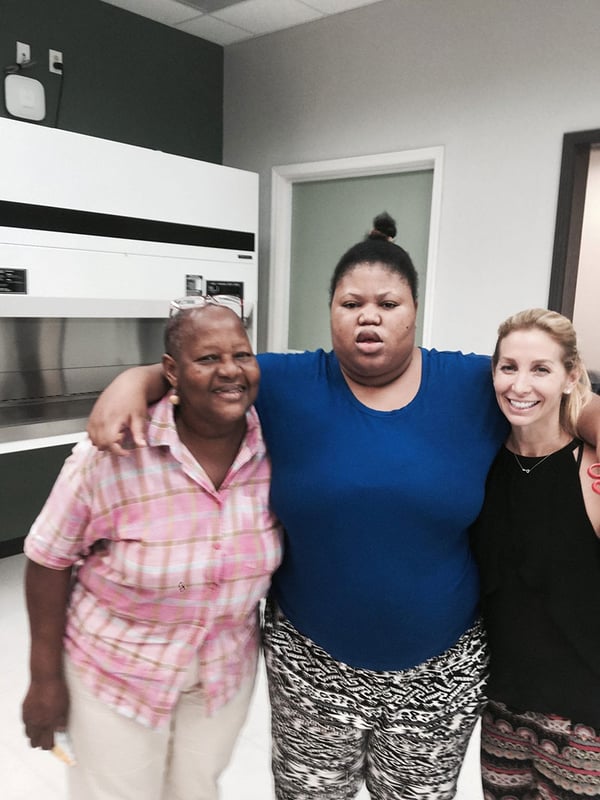
UMHS AUTISM WORKSHOP: (left to right) Ms. Cotton, Shafeeka Cotton (an adult woman with autism) with Dr. Sheryl Rosin at free clinic at UMHS. Photo: Michelle Peres
What are some things future doctors should know about autism?
They should know that:
- There's probably not one single answer to the etiology (cause) of autism. Just as autism is a spectrum, there's a spectrum of etiologies, a spectrum of causes. Based on epidemiological data, we know that one of the associations is advanced paternal age; that is, increasing age of the father at the time of conception. In addition, another vulnerable and critical period in terms of development is when the mother is pregnant. During that period, while the fetal brain is developing, we know that exposure to certain agents can actually increase the risk of autism. In particular, there's a medication, valproic acid--which mothers with epilepsy sometimes take--we know can increase that risk of autism. In addition, there can be some infectious agents that can also cause autism. In certain individuals, they can have autism for a reason that is genetic, running in families, but yet in some not because of autism running in the family. In these individuals, they can actually have genetic changes or mutations that are not passed down from the mother or from the father, but actually start brand new in them, mutations that are present in the egg or the sperm at the time of conception but have not been passed down generation through generation within the family.
- There are also genes that can cause autism, but we don’t know exactly what the genes are or if is it one gene or potentially a combination of genes. It appears that there is not simply one gene for autism. In fact, the current estimates are that there are 200 to 400 different genes that can cause autism. And that explains, in part, why we see such a broad spectrum in terms of its effects.
- That early intervention is the key to success! By participating in evidence-based early intervention programs, children can make positive gains in their communication, social skills, and behavior. The brain is so malleable to change in its younger state that by getting the diagnosis early and using the appropriate interventions, the neural connections in the brain can change for better outcomes for the child in the future. Pediatricians need to learn the red flags, screen, and refer for diagnosis as soon as the symptoms come into play because a false positive is better than a false negative of “wait and see!”
What are some of the misconceptions about autism besides all the misinformation about vaccines?
- The appearance of autism is relatively new. Autism was first described by scientist Leo Kranner in 1943, but the earliest description of a child now known to have had autism was written in 1799.
- Autism is a mental health disorder. Autism is a neurological disorder. Studies of the people with autism have revealed abnormalities in brain structure and neurotransmitter levels.
- Autism is caused by poor parenting or "refrigerator mothers.” In the 1950s, there was an assumption that autism was caused by emotionally distant or cold parents. Though the exact cause of autism has not been determined, it is now firmly established that autism has nothing to do with parenting.
- Individuals with autism are unable or unwilling to form meaningful social relationships. Though many individuals with autism have difficulty with social interaction, they can have close social relationships, fall in love and have children.
- All individuals with autism have mental disabilities. Individuals on the autism spectrum have earned college and graduate degrees and work in a variety of professions.
- People with autism are cold and lack empathetic feelings. Individuals with autism feel as much, if not more, empathy than others, but they may express it in ways that are harder to recognize.
- Autism can be cured. There is currently no cure for autism spectrum disorders.
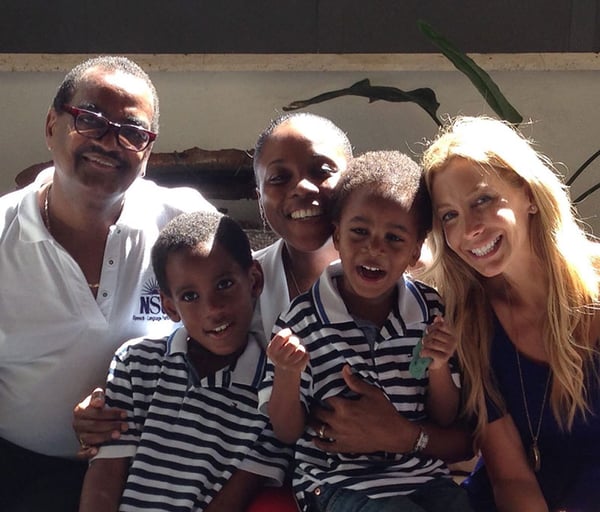
DR. ROSIN AT WORK IN ST. KITTS: (Top) Parents Verall & Mauricer; (bottom, left to right) Eddy & Mathieu Marshall with Dr. Sheryl Rosin. Photo: Michelle Peres
Tell us a little about your background as an autism specialist.
I began working with individuals with autism in 1994, just when the definition of autism expanded in the DSM-IV [a manual published by the American Psychiatric Association (APA)]. I was working as a pediatric speech-language pathologist in an outpatient rehabilitation center within a hospital setting in Royal Oak, Michigan. I was one of the only therapists that would work with these clients as there was little known about how to effectively treat it at the time. So I began to research and educate myself in order to best service my patients. From these experiences, I decided to obtain my Ph.D. in speech-language pathology with a specialization in autism spectrum disorders. During my doctoral studies, I was afforded the opportunity to take courses within various departments outside of speech-language pathology in order to learn about autism from a variety of different professionals so I took courses in the school of medicine, psychology, education and pharmacy. Learning from all of the different disciplines provided me with a greater understanding of the disorder and how to diagnose and treat it.
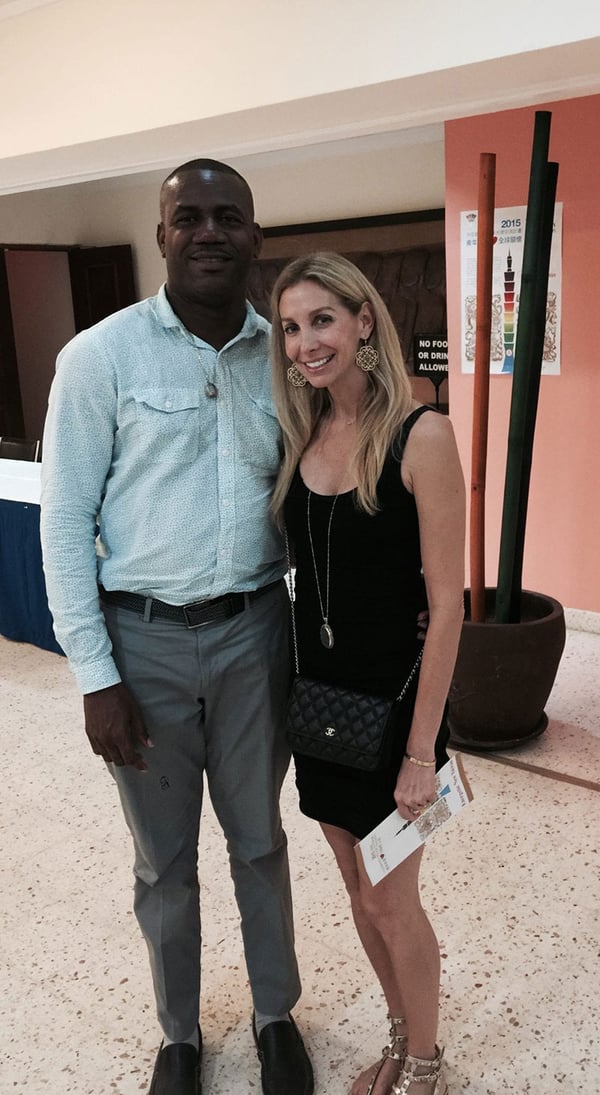
WITH ST. KITTS & NEVIS OFFICIAL: Deputy Prime Minister & Minister of Education for St. Kitts & Nevis, the Honorable Shawn Richards with Dr. Rosin. Photo: Michelle Peres
On the subject of vaccines, the UMHS Endeavour has run several articles during the past two years about how science has proven that vaccines do not cause autism. We just ran a series in August for National Immunization Awareness Month. Is there anything you think people should know regarding this issue?
I am not sure what you said in your article, but if you didn’t say it, I would make sure you explicitly say that vaccines do not cause autism. In fact, the original research study that suggested that was the case was completely fraudulent. It was actually retracted from the journal Lancet, in which it was published, and that author, a physician, had his medical license taken away from him. The Institute of Medicine and The Centers for Disease Control and Prevention have repeatedly investigated this and there is no credible evidence that vaccines cause autism. Furthermore, one of the ingredients in vaccines, something called thimerosal, was thought to be what the cause of autism was. That was actually removed from vaccines in the year 1992, and it did not have an effect in what happened with the prevalence of autism. So again, there is no evidence that this is the answer. So the question remains, what does cause autism? Unfortunately, there is not one single answer.
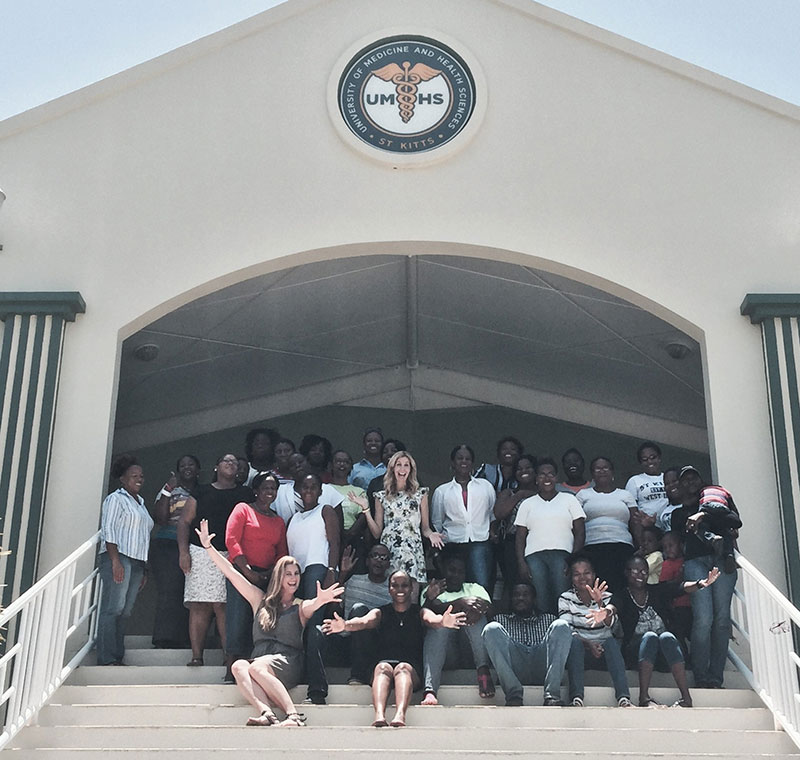
GROUP PHOTO AT UMHS: Dr. Sheryl Rosin (center) with friends at UMHS. Photo: Courtesy of Dr. Sheryl Rosin
(Top photo) DR. ROSIN WITH FAMILY SHE HELPED: (left to right) Eddy Marshall, Dr. Sheryl Rosin, Mathieu Marshall & Mauricer Marshall. Photo: Michelle Peres
About UMHS:
Built in the tradition of the best US universities, the University of Medicine and Health Sciencesfocuses on individual student attention, maintaining small class sizes and recruiting high-quality faculty. We call this unique approach, “personalized medical education,” and it’s what has led to our unprecedented 96% student retention rate, and outstanding residency placements across the US and Canada. UMHS is challenging everything you thought you knew about Caribbean medical schools.

Scott is Director of Digital Content & Alumni Communications Liaison at UMHS and editor of the UMHS Endeavour blog. When he's not writing about UMHS students, faculty, events, public health, alumni and UMHS research, he writes and edits Broadway theater reviews for a website he publishes in New York City, StageZine.com.













